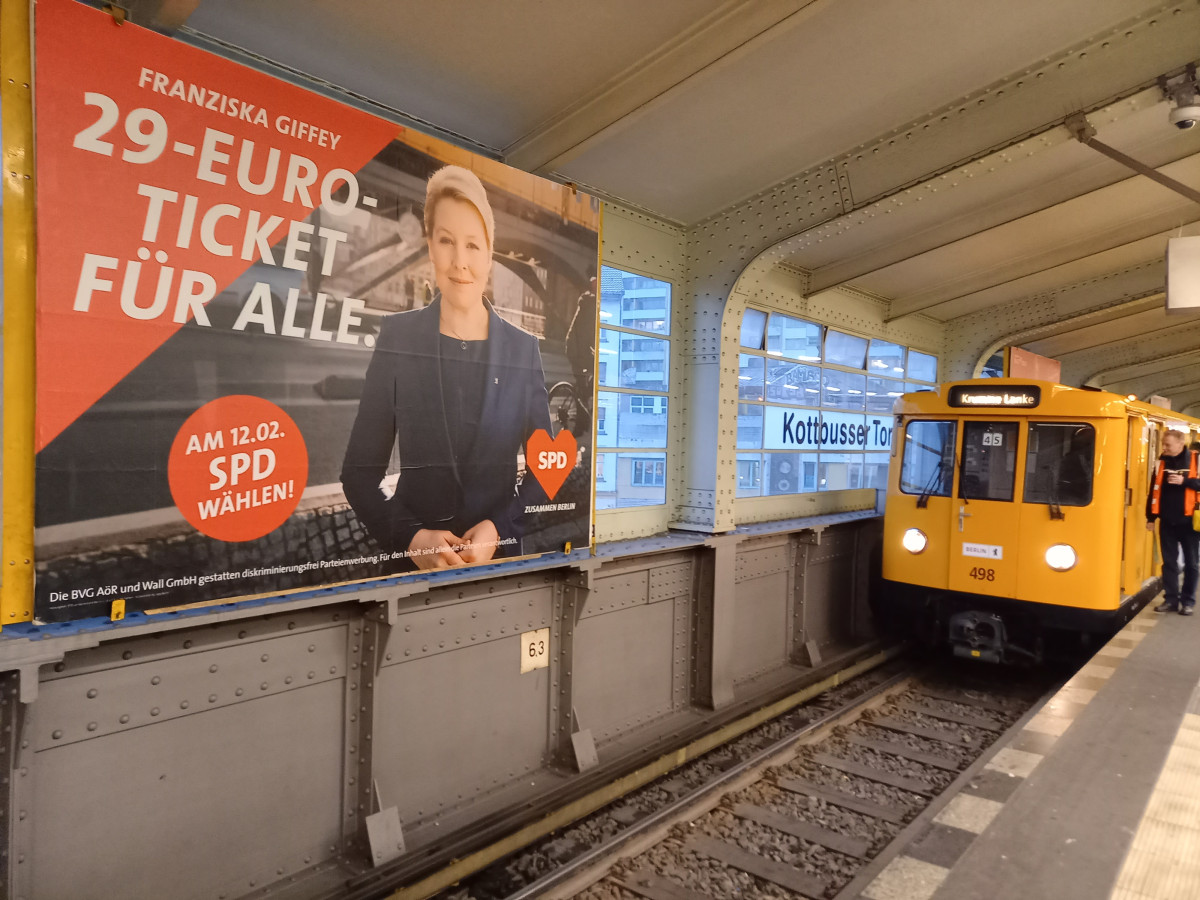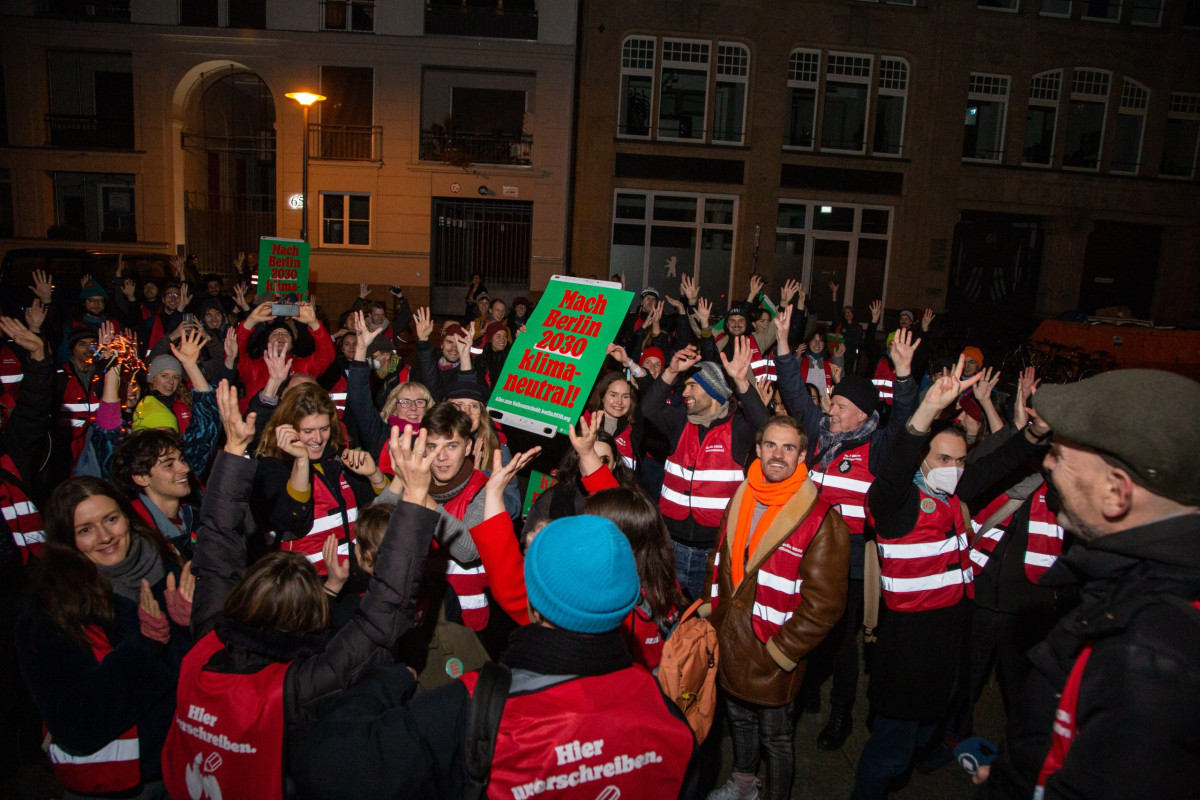Climate debates and war in Ukraine on citizens’ minds as city of Berlin votes again
Nearly a year into the war in Ukraine and in the midst of debates about how to handle rising energy prices, voters in the city of Berlin will head to the polls to elect a new state parliament that decides who will govern Germany’s capital in the coming years. The vote on 12 February is no regular election, however: It’s a repeat of a vote that originally happened more than a year ago, which Berlin’s constitutional court declared invalid due to election-day irregularities and glitches, a failure widely seen as emblematic of the city's notorious administrative difficulties.
The current government, a three-party coalition between the Social Democrats (SPD), Greens and Left Party with the SPD’s Franziska Giffey as mayor, is defending its position. The center-right Christian Democrats (CDU), which is currently in opposition under party leader Kai Wegner, has made gains and currently leads in the polls; however, it may lack a coalition partner to topple the current government.
The campaign has largely focused on how to improve Berlin’s signature dysfunction in areas like bureaucracy, transportation and housing. Transportation, in particular, has proven a contentious issue between parties who want to take more steps toward a car-free future and those who prioritize automobile infrastructure. But the election comes at a time when big-picture climate and energy issues, including high energy prices and protests over the clearing of the town of Lützerath in western Germany, are very present on voters’ minds as well.
Debate over transportation policy
In the campaign, climate and energy issues have largely been focused on discussions about Berlin’s transportation policy. The Greens, for example, have advocated for a transportation policy oriented away from cars and toward more environmentally friendly modes of transport, proposing new fees for drivers that would help subsidize greater investments in bicycle infrastructure and public transit. Their top candidate, Bettina Jarasch, has called for greater investments into car-free zones, including along a main street in the city’s central Mitte neighborhood.
The CDU, meanwhile, says “demonizing” cars and drivers is the wrong approach: its leaders want to continue investing in auto-related infrastructure projects, such as the extension of the A100 highway that will cut through central districts of the capital. The SPD, for its part, has sought to find middle ground between the two parties’ positions. The party of incumbent mayor Giffey wants to expand infrastructure for electric vehicles and says an A100 extension should be left up to the voters. It also advocates for a 365-euro annual transit ticket to encourage people to choose greener transport options.
Berlin’s government has committed to making the city carbon-neutral by 2045, but has said it hopes to reach its goal sooner than that. By 2030, the city plans to reduce its emissions by 70 percent compared with 1990. When the current coalition took office in late 2021, it vowed to invest in renewable energy and create a committee to regularly evaluate the city’s progress toward meeting its climate goals. The election will impact the extent to which these goals continue to be a priority for Berlin’s government: if the SPD and the Greens end up back in the governing coalition, they will likely continue their work on this front.
Pressure to make Berlin climate neutral 15 years earlier than planned has mounted since the last election, with initiative Klimaneustart Berlin securing a referendum after collecting over 261,000 signatures for its campaign Berlin 2030 climate neutral. Eligible residents are set to vote on whether Berlin’s target should be amended in law on 26 March.
National focus on energy and climate
As the city with its some 3.7 million inhabitants prepares to vote, the war in Ukraine, and the resulting impact on Germany and Europe’s energy landscape, remain the biggest topic in German politics. For most of the fall and summer, voters named energy supplies as their top issue; now, as fears of potential energy shortages have quieted, the war has risen back to first place again. In a late January poll from Forsa, 68 percent of those surveyed named the war as their top issue, followed by 22 percent who named energy supplies and 14 percent who named climate issues.
The federal government has introduced various measures to ease the pain of higher prices on German consumers, including subsidies to help cover energy bills and a cap on energy prices going forward. These issues are on voters’ minds as they cast their ballots — but are things that are largely determined by the federal government, however, which makes them difficult to debate in the Berlin campaign. “The difficulty for the parties… is these are problems that actually can’t be solved on the city level,” said Gero Neugebauer, a political analyst. Parties can vow to do things like streamline services for refugees, he said, but “because of the political structure [in Germany], there are no real possibilities to solve the fundamental problems themselves.”
Ongoing protests by climate activists from the Last Generation and other groups have also made headlines in recent weeks and months. The German capital had been one of the main locations of protests, which could impact the way voters consider the parties in Berlin. Last month, climate activists staged protests in the western German village of Lützerath, which is being demolished in order to expand a nearby lignite mine. The Lützerath protests come on the heels of the climate-related protests in Berlin and cities across Germany, with activists from the Last Generation movement blocking runways at Berlin’s airport and blockading sections of the autobahn in an effort to get attention from the national government.
The increasing pressure from climate activists has put the Greens, who are part of the national governing coalition, in a tough spot: they’ve had to defend their more pragmatic choices since entering government, while climate activists say they’re abandoning their values as a climate-focused party.
Perceived mismanagement as top issue
In November, Berlin’s constitutional court declared the results from the September 2021 election invalid, saying that the “number and severity of the electoral errors” necessitated a re-vote. On voting day, polling stations ran out of ballots or received ballots for the wrong districts; the Berlin Marathon and a reduced number of polling stations led to long lines and meant some voters didn’t cast their ballots until after the polls had officially closed.
Given the reasons the election is happening in the first place, it’s perhaps no surprise that fixing Berlin’s perceived dysfunction is the top issue in the campaign. In recent decades, the city has gotten a reputation for being badly managed, which impacts various aspects of the city’s administration and policy. The CDU, which is in opposition, has run on the promise of streamlining Berlin: one campaign poster featuring the party’s top candidate Wegner reads: “Celebrate Berlin, Fire the Senate.”
In addition to the contentious discussion over transportation policy, parties have debated the best way to ease the city’s housing crisis, which has intensified in recent years and been exacerbated by the arrival of refugees from Ukraine. They’ve also focused on how to improve the city’s administration, reducing wait times for residents to handle basic municipal tasks like registering their apartments or paying their taxes.
Berlin’s special position
Berlin is, in many ways, an exception within Germany and the city plays a unique role in German society. As the country’s biggest city and a cultural center, its protest-happy young population and range of new companies working in the tech and climate industries make parts of it much more progressive than Germany as a whole. Berlin is also unique because it was a divided city until after the fall of the Berlin Wall in 1989, meaning it is still shaped both by old West German attitudes and East German history.
Structurally, Berlin is one of the country’s three city-states, meaning it has both a city-level government and the equivalent of a state parliament. It is further divided into twelve separate districts, each coming with their own borough mayor. Members from the Berlin governing coalition sit in the Bundesrat, Germany’s second legislative chamber, alongside representatives from the other 15 states; the mayor of Berlin is equivalent to a state governor.
“The structural problems that Berlin has, together with a certain mentality of … being a world city but on the other hand having very local and very normal problems, all this together makes Berlin very special,” Peter Matuschek, the chief political analyst at Forsa, told Clean Energy Wire.
In large part because of the city’s unique political position and in part because this is a repeat election, analysts say Berlin’s election is unlikely to have much of a direct effect on the federal governing coalition. But it may hint at what’s to come in other state-level elections slated for later this year, for example in the industry powerhouse Bavaria and the wealthy central state of Hesse (both 8 October).
Conservative CDU in the lead
Polling in the race puts the center-right CDU in the lead, followed by the Greens and the SPD in close contention for second place. A poll from national broadcaster ARD published on 2 February found the CDU extending its lead to 25 percent, compared with 19 percent for the SPD and 18 percent for the Greens. Three smaller parties — the Left Party with 12 percent, the populist far-right Alternative for Germany (AfD) with 10 percent, and the pro-business Free Democrats with 6 percent — are also in contention to win seats in the state parliament. Back during the 2021 election, the SPD was in first place with 21.4 percent, followed by the Greens with 18.9 percent and the CDU with 18 percent.
Even though the CDU looks poised to come out on top, it’s unlikely they will end up leading the next Berlin government. The two other biggest parties, the Greens and the SPD, have more policy positions in common and will most likely opt to form a government together (likely with the help of a smaller third party).



